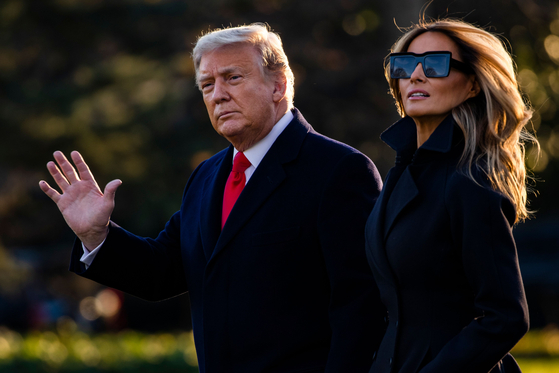![US President Donald Trump and his wife moved to Marrakech, Florida resort on the 23rd to celebrate the Christmas holidays. [AFP=연합뉴스]](https://i0.wp.com/pds.joins.com/news/component/htmlphoto_mmdata/202012/24/f22978e5-75b5-4a32-b267-492f5b8d632a.jpg?w=560&ssl=1)
US President Donald Trump and his wife moved to Marrakech, Florida resort on the 23rd to celebrate the Christmas holidays. [AFP=연합뉴스]
US President Donald Trump passed Congress on the 23rd (local time) and vetoed the 2021 National Defense Authorization Act (NDAA), which was ahead of the presidential signature. The bill would be sent back to Congress to vote again whether to neutralize the president’s veto.
Trump Sends Congress Message “Deny Defense Authority Act”
“The NDAA, which restricts USFK reduction, is unconstitutional”
Congress will soon re-vote, leaving the first case of veto power disabled
As it has already been passed in Congress with overwhelming support from both Democratic and Republican parties, it is highly likely that the presidential veto will be invalidated. Nevertheless, it is interpreted that President Trump’s veto is a final battle with Congress before leaving the White House.
In a message to Congress that day, President Trump said, “This law has failed to include important national security measures, failed to respect the history of veterans and military, and our administration’s efforts to prioritize the United States in national security and foreign policy. “I fall in love with” he said.
Specifically, he argued that the law “restricts the president from reducing US troops stationed in Korea, Germany and Afghanistan,” and that “this is not only a bad policy but also unconstitutional.”
“According to Article 2 of the US Amendment, the President is the supreme commander of the military and has all administrative powers, so the president has the right to decide where and how many troops to send, including Korea, Germany, and Afghanistan,” he said. Congress should not infringe on this.
The NDAA has made it difficult procedurally to reduce US troops dispatched abroad. It contains content that prevents the use of the budget to reduce the size of the USFK to less than 28,500 currently.
The US military in Germany should also submit a report on whether it is in national interest if it is reduced to less than the current level of 34,500. An evaluation report should also be issued when reducing US troops in Afghanistan.
President Trump pointed out that the law directly contradicts the administration’s foreign policy, particularly denying his efforts to bring US troops home.
President Trump also clarified his opposition to the so-called “correcting history” provisions, such as changing the names of military facilities named after the generals of the Southern Union who defended slavery in the past.
It was also mentioned that the NDAA did not include the abolition of Article 230 of the Communication Quality Act, which prevented social media companies from holding legal responsibility for content uploaded by users on social media.
Spreading false information from abroad via social media is a serious threat to national security and election integrity, so it is argued that the NDAA should deal with it, and lawmakers believe this is not an issue to be addressed by the NDAA.
As President Trump has announced the exercise of his veto, Congress has already scheduled a meeting to re-vote the bill after Christmas.
The House of Representatives is scheduled to meet and vote on the 28th, and the Senate plans to meet after the 29th. If two-thirds or more of the Senate and House of Representatives each agrees, the presidential veto can be invalidated.
Earlier this month, the Senate and House of Representatives passed the NDAA with overwhelming approval of more than two-thirds each, and the Republican Party is also in a position to deny the presidential veto, so it is predicted that the bill will be passed again.
Senate military chairman James Inhoff, a Republican member of the Republican Party, said in a statement that “NDAA has been passed for 59 consecutive years as an important law for national security. This year is no exception.”
Democratic House Speaker Nancy Pelosi criticized the president’s veto as “reckless behavior that harms the military and puts security at risk.
The Washington Post said it would be the first case for Trump’s four years in office if Congress revokes the veto.
President Trump also opposed the $900 billion (about 1,000 trillion won) economic stimulus bill passed through Congress and called for amendment. On the night of the 22nd, he criticized Twitter as “the bill is very different from what was expected,” and “this is a shame.”
President Trump will not formally veto the stimulus bill, but it is likely that he will deny it by delaying its signature.
If President Trump doesn’t sign the bill, the federal government could start shutting down early next week because the federal budget would run out on the 28th, Reuters reported.
Politico interpreted that President Trump’s retirement on the 27th was a flagrant attempt to show the final decisive battle with Congress when President Trump subsequently rejected legislation agreed by Congress.
CNN explained that President Trump, who enjoys the spotlight, is a device to capture the media and public interest in himself at the end of his term.
President Trump and his wife Melania moved to his own resort in Florida to spend the Christmas holiday.
It is not known how long Trump will be here or return to the White House, CNN said.
Washington = Correspondent Park Hyun-young [email protected]
